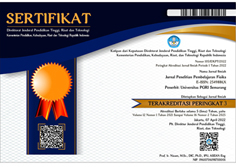Pengaruh Pembelajaran Blended Learning Berbantukan Media Aplikasi Quipper School terhadap Minat, Kemandirian, dan Hasil Belajar pada Materi Gelombang Mekanik Siswa Kelas XI SMA Negeri 1 Cawas
Abstract
The aims of this study are to determine the differences in students’ learning interest, to know the differences in the level of students’ learning independence, to know the differences in achievements of cognitive learning outcomes of students who learn conventionally and those who learn using blended learning method. The type of this research is quasi experiment with pretest-posttest controlled group design. Control class learn conventionally while experimental classes learn in blended learning, which is a conventional learning process combined with online learning, by utilizing the application of Quipper school. Students’ learning interest in control class before the learning process gets an average value of 118.74 while after the learning process gets an average value of 123.78. As for the experimental class, before the learning process gets an average value of 119.89 while after the learning process gets an average score of 131.21. For the level of students’ learning independence of the control class during the learning process gets an average score of 28.5 while for the experimental class during the learning process gets an average score of 35.1. So there is a difference of 6.6 between the control class and the experimental class. The students’ cognitive learning outcomes of the control class before the learning process gets an average score of 40.3, while after the learning process gets an average score of 58.67. As for the experimental class, before the learning process gets an average score of 42.29 while after the learning process gets an average score of 76.71. So the increase of control class is 18,37 while experiment class is 34,43.
Full Text:
PDFReferences
Rizkiyah, Apriliya. 2015. Penerapan Blended Learning untuk Meningkatkan Hasil Belajar Siswa Pada Mata Pelajaran Ilmu Bangunan di Kelas x TGB SMK Negeri 7 Surabaya. Jurnal Kajian Pendidikan Teknik Bangunan. Volume 1 Nomor 1/JKPTB/15(2015): 40-49.
Sandi, Gede. 2012. Pengaruh Blended Learning Terhadap Hasil Belajar Kimia ditinjau dari Kemandirian Siswa. Jurnal Pendidikan dan Pengajaran . Jilid 45. Nomor 3, Oktober 2012.
Chu Shih, Ru.2010. Blended learning using video-based blogs: Public speaking for English as a second languge students. https://www.semanticscholar.org/paper/Blended-learning-using-video-based-blogs-Public-sp-Shih/399cff6efa7dc13bc0cb44f141b557a8483c21a9
Dobrzanki, LA & F.Bro.2008. E-Learning on the example of materials science. https://www.researchgate.net/publication/26872231Elearning_on_the_example_of_materials_science
Bibi, Sarah dan Handaru Jati, 2015. Efektivitas Model Blended Learning terhadap Motivasi dan Tingkat Pemahaman Mahasiswa Mata Kuliah Algoritma dan Pemrogaman. Jurnal Pendidikan Vokasi vol 5, Nomor 1, Februari 2013.
Keshta, Awad Soliman dan Ismail Ibrahim Harb.2013. The Effectiveness of a Blended Learning Program on Developing Palestinian Tenth graders’English Writing Skills. Educational Journal. Vol.2, No. 6 pp. 208-221, 20 Oktober 2013.
Untara, Ketut Alit Adi.2014.Pengaruh Pembelajaran Blended Cooperative E- Learning Terhadap Hasil Belajar, Self-Efficacy dan Curiosity siswa dalam Pelajaran Fisika di SMA Negeri 1 Palu. Jurnal Sains dan Teknologi Tadulako, volume 3 Nomor 1.Januari 2014 hlm 82-90.
DOI: https://doi.org/10.26877/jp2f.v8i2.1625
Refbacks
- There are currently no refbacks.
Copyright (c) 2017 Jurnal Penelitian Pembelajaran Fisika

This work is licensed under a Creative Commons Attribution-ShareAlike 4.0 International License.
Attention:
Starting vol. 15 issue 4 October 2024 JP2F has moved to a new website address
https://journal2.upgris.ac.id/index.php/jp2f/index
The submission process will only be served on the web above.
Copyright of Jurnal Penelitian Pembelajaran Fisika ISSN 2086-2407 (print), ISSN 2549-886X (online)
Gedung Utama GU.2.01 FPMIPATI, Universitas PGRI Semarang
Jl. Lontar No. 1-Dr. Cipto, Kampus 1 UPGRIS, Semarang
Email: [email protected]








